Does time-out work with kids?
Find out why we don’t use timeout with our kids, and try one of these gentle, respectful, alternatives to time-out.
“If we were at home, she’d be sitting in the naughty corner for doing that!” she told me.
I could tell that the play group mum was embarrassed by her three year old’s behaviour, but really, it was pretty normal behaviour for a three year old.
“Do you have somewhere I can put her in time out?” She asked.
Now it was my turn to feel embarrassed and uncomfortable.
“I .. uh… no, sorry, we don’t use time out.”
Suddenly all eyes were on me as the play group mums couldn’t believe what they had just heard.
No time out?
What do you do when they are being naughty?
Do you just let them get away with it?
We don’t use time out with our kids, but we don’t just let them ‘get away with it’ either.
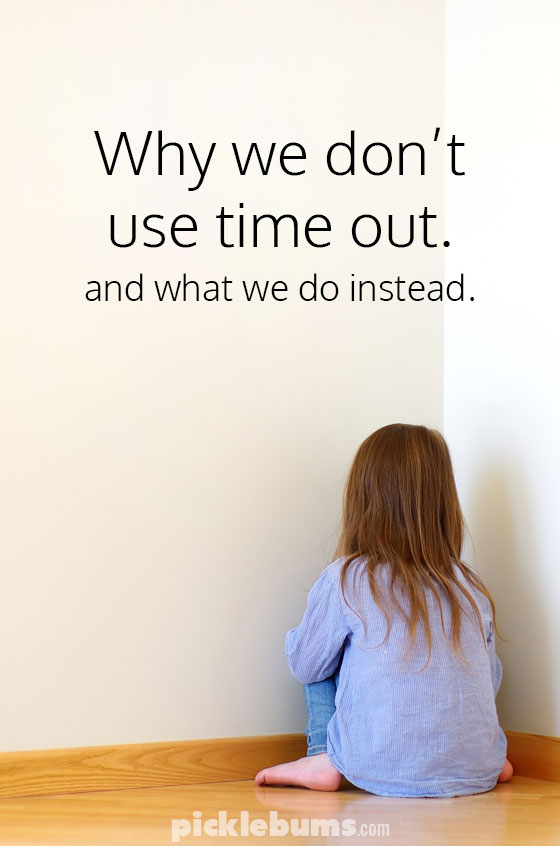
Reasons Why We Don’t Use Time Out
We don’t use time outs because chairs aren’t ‘naughty’ and corners aren’t ‘naughty’ and children aren’t ‘naughty’.
Children are simply small humans who are trying to work out the world and manage their emotions. They make mistakes (just like adults do) but that doesn’t make them ‘naughty’.
We don’t use time outs because behaviour is communication.
When a child misbehaves they are trying to tell you something, if we ignore the reason behind the behaviour it won’t help them learn to do better, or change the behaviour in the future.
We don’t use time outs because little children can’t ‘think about what they’ve done’ without help.
Even older children struggle with working out their emotions, thinking about the impact of a situation, and figuring out how they can do better. We need to talk to our kids, to explain, to teach, to show them, not ignore them and magically hope they figure it out on their own.
We don’t use time outs because it sets adults and children up for a power struggle.
It makes our kids feel anger and frustration towards us, it makes them more defiant and it breaks the connection between us. Without that connection our kids are less likely to accept limits when we need to set them, and they are less likely to communicate effectively or respectfully with us.
We don’t use time outs because when did being forced to do something they don’t want to do ever help someone calm down quickly?
Children need help to understand and manage their emotions, and children don’t learn when they are in meltdown mode.
We don’t use time outs because isolating, ignoring, and withdrawing our love from children can make them feel like they are bad people, or that we only love them when they are being ‘good’.
Loving our children doesn’t ‘reward’ misbehaviour. Offering comfort and attention doesn’t let our kids ‘get away with it’, not following through with limits does that. You can set clear limits while still loving your child.
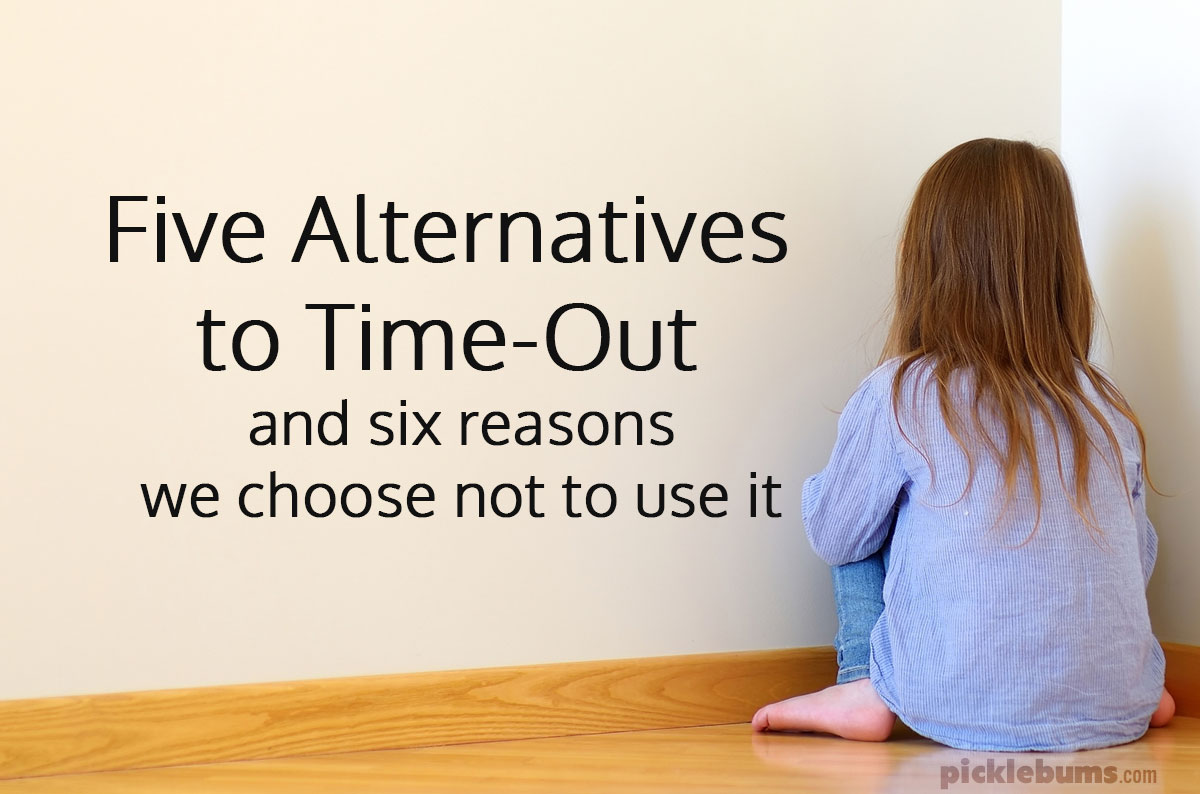
Five Alternatives to Time-Out
The concept behind time outs – ‘to give kids a break from a situation they find difficult’ – isn’t a bad thing, but it seems to have evolved into isolating, shaming and ignoring. None of those things help our kids learn to do better.
So if you don’t use time outs, what can you do instead? Try one of these gentle and respectful alternatives to time-out.
Check your Expectations.
Before you do anything, ask yourself, can my child really be expected to manage the things I am asking of her right now?
An 18 month old can’t share, my 9 year old can’t make a good choice when he is tired and overwhelmed, and most kids are not doing things with the sole intent to make you angry or push your buttons. When you shift your thinking from the perspective of ‘they are doing this on purpose and they should know better’, to ‘perhaps they can’t manage this right now’, it’s much easier to respond, rather than react.
Step in and Help
When things do go pear-shaped, step in and actively help your child manage the situation they are struggling with.
Give them words for their big emotions, acknowledge the situation, remind them of the limits, and show them how they can manage things.
That might look like – “Looks like you are mad with your brother because he won’t play the game the way you want him to. It’s not ok to hurt him, can I help you talk to him and sort it out?”
Remove them from the Situation, Gently!
Sometimes you need to remove your child from an escalating situation, which is fine, but don’t do it as punishment, or in isolation.
Explain why they need to move away, give them somewhere else to go, and something else to do that will help them calm down. Sometimes that will mean physically removing a small child from a situation and then holding them or staying near by while they melt down. Sometimes that will mean asking an older child to remove themselves to another room because the situation has gotten out of control and offering them ideas of how they can help themselves calm down. Sometimes it is just suggesting that it would be a good idea to take a break from a frustrating situation and go do something else.
Offer a ‘Do-over’
Offering a ‘do-over’ is a great technique to try, especially with older kids. We all loose our cool sometimes, and say or do things we immediately regret. Instead of shaming your child for making a mistake, offer them a chance to try again and make a different choice. For younger kids you may need to help them to find a better alternative, but older kids will almost always know what they wish they’d said or done, and gently offering them a second chance, without shame or judgement, teaches them that we all make mistakes and the important thing is to do better next time.
Role-model what Positive Time-Out Looks Like.
Time out is not a terrible concept. It’s much better to use a time out occasionally than to loose it and yell or lash out, but in those situations the person most in need of a time out is usually us adults.
When you are frustrated, or overwhelmed, and you know we are close to losing it, take a few moments to calm down. Not only does that give you some time to think things through and make better choices before tackling difficult issues, it shows your kids how to use time out as a positive way, to calm down before moving on.
If your kids are older you can also ask them to give you some time out. You can’t always abandon dinner preparations because you are frustrated, but you can ask your older kids to give you some space and explain why. This teaches our kids that it is ok to say when you are not coping, and it’s ok to ask for some time to get things together.
How do you manage big emotions, mistakes, and misbehaviour in your family?
If you are struggling or would like to move away from punishment then these gentle parenting posts might help:

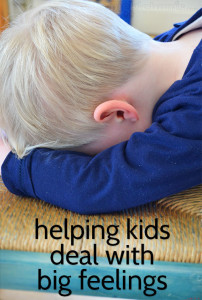
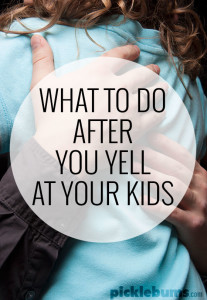
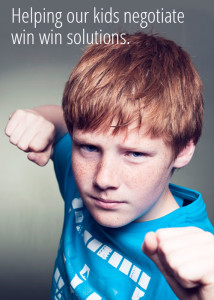
Well, actually… we used to use time out , or rather removing the kids from the situation they freak out about — and I still use it for myself today… Not as punishment but as time to calm down. I had read that a kid who’s being overwhelmed with her/his emotions needs one minute for each year she/he’s old to calm down again… and it actually proved to be true… no matter how old the kids were at the time, it took them that many minutes to walk out of their room again and be all calm as if nothing ever had happened. And the same for me: if I’m in a shitty mood and can’t tolerate anyone around me, it takes me about as many minutes as I am old until I can face society again. Really weird how that works, but it does, :-).
You are spot on. Actually, that is how time out was intended to be used – as a calm down, not a punishment. I had the fortune to work with a play therapist who had personally worked with the lady who started the “Time Out” movement and she trained me on it’s proper use. It is a calm down technique until the person can be helped to work through whatever situation caused the need for a time out. Ideally time out should be used before the problem escalates to meltdown mode. When you see a child having difficulty, remove from the situation and give him/her something calming to do or teach a calming strategy. That way kids learn how to manage the situation before they get out of hand. After the child is calm their should be “processing” with an adult about what happened, how it made their heart feel, and things that can help their heart feel better the next time they feel that way. Unfortunately it became distorted by people who implement it like the old chair in the corner of the classroom of days gone by – as a punishment. Time out locals should never be called the naughty chair, corner, spot, etc, and children are not naughty.
We don’t use time out either. We spank *gasp*. The Bible is pretty clear on this, and as a person claiming to be a bible-thumping-Christian, I follow exactly what it says “spare the rod, spoil the child”. I also prayed my children and back it with a lot of positive reinforcement for when they are amazing (which is more often than not). But you better believe we spank when needed and I’m tired of feeling like I have to hide that. My children a fantastic kids, because they have clear limits and clear punishments. That’s what children need: parents that love them enough to spank.
Everyone parents in different ways, but I do not advocate violence towards any one, and I don’t agree with spanking for any reason, but I know it must not be easy to be honest about this topic sometimes, so thanks for taking the time to share your thoughts with us.
Hello my name is Maggie.
I am a 46 year old mother of 5 sons. Their ages are 19, 17, twins 16 and 12.
With all do respect, spanking is not violent, that is not a matching card. Sorry.
I spanked and there was time out. I am an only child and was raised the same way. I thank God my parents raised me this way because my life was amazing. My sons thank me ALWAYS!! they tell me every single day that they LOVE me even in front of their friends.
They have black belts in Karate.
My eldest is in University over seas. My second, third and forth are preparing for university.
My youngest plays soccer for a well known soccer club so I am extremely proud of my son’s.
They don’t smoke,drink alcohol or do drugs. They have jobs and one son even has two jobs…landscaping and special event banquet hall.
My sons see how other mother’s raise there kids and how they behave, even behind their parents back…amoung other things that are not good.
We talk about everything…nothing and I really mean nothing is a taboo.
My son’s are compassionate, loving and very respectful.
So there you go…my personal results from spanking and time out.
Whoever calls it the “naughty corner” should just change it to “time out”. Young or Old we ALL need it. That’s Life!
So prepare them well or they will turn to drugs and run away from home.
Thank you for taking the time to read my short story.
God Bless!!
When have you seen a shepherd whack a sheep. Biggest biblical misinterpretation to date. When a shepherd uses a rod he uses it to keep the sheep going in the desired direction . The rod is just a figurative representation of directing and leading the flock. (or children). The bible uses symbols and common sense should be used in interpreting those symbols, that being said a good shepherd does not use his rod to hit his sheep he guides with it when sheep veer off the track.
So the bible does say something similar to “spare the rod, spoil the child.” Here are several different translations of this verse: http://biblehub.com/proverbs/13-24.htm. NIV says “Whoever spares the rod hates their children, but the one who loves their children is careful to discipline them.” It is the “rod” that people often equate to spanking. In truth, the rod in this case is most likely referring to a shepherd’s staff. It is intended to illustrate guidance, not spanking as we know it. I imagine that the writer of this proverb had more of what Kate has in mind, a gentle guidance over a severe punishment. Great article!
I have not had the opportunity to raise children, but in massage training we discussed how we carry emotions in our bodies. Observe a child when they are being disrespected. They go into a slump.
as I was reading the above comments, it came to me that the rod is the word of God.
I mean not to offend, just to offer a different perspective.
In my 3 years of marriage both my husband an I have said, I need a time out and removed ourselves until we felt better.
I really appreciate how Katie is respectfully commenting.
have a blessed day!
Well said Amanda. Therein lies the problem. Spanking is NOT violence when done properly and for specific reasons. That is where spanking has been shamed when parents say “I do not advocate violence”. Please. If you think it’s violent you’re not doing right and for the wrong reason. I myself was only spanked a couple times as a child…no physical marks and love and discussion afterward. I also guarantee I did not do what I did ever again. Yes it may not be for everyone but do not use “advocating violence” as a reason. Many of the teenagers I’ve come in contact today could have used a few spanks instead of “discussions about their feelings” lol.
This is not a post about whether or not spanking is ok, so I don’t want to turn these comments into a debate over that, nor a debate over the interpretation of the bible.
Whatever you call it, or however you frame it, physical discipline is not something I agree with, and not something I choose to use with my children or to encourage on my website. Thank you to everyone who has commented on this tricky topic in a respectful way.
The rod spoken of in the Bible is the hooked rod the Shepard uses with his sheep. The way the rod is used is to signal and guide the sheep to safely move from one pasture to the next. If a sheep wandered to close to danger the Shepard could usr the hoik to pullhim to safety, again keeping his sheep safe through guidance.
Spare the rod (parental guidance as a Shepard uses his wisdom and guidance to Shepard his sheep) spoil the child.
I support those who spank and those who do not. My three year old son does not respond to me spanking him. He looks at me a laughs and then displays worse behavior. If my husband spanks him (he never does so enough to even hurt) it works. However, if I give my son “timeout” (which is his time to think about what he could have done differently) he doesn’t do it again (at least for that day). If my husband does “timeout” it does not work.
Shepherds use their rods to gently guide their sheep in the right direction rather than hit or beat them with it. So “spare the rod, spoil the child” has nothing to do with physical punishment. It means that children need guidance from care takers to learn how to navigate this world as responsible human beings. I love that you use positive reinforcement. pray over your children and have clear limits. But why impose physical violence and harm to your children if you can get the same result by using the more positive measures you already have in place by just adding the verbal guidance that goes with de-escalation and problem solving?
We don’t do time outs either, my kids don’t need it at this age (although if it had have actually helped when they were pre schoolers i would have persisted with it, on the occasions I attempted it it just made everything worse!). Mainly our reasons are similar to yours, I don’t want my girls to feel ashamed or naughty because they are very sensitive and I can see that being made to feel that way affects their self esteem. When they do something I don’t like or that they know they aren’t supposed to do we simply talk about it, or wait until they have calmed down before talking about it. If they fight, argue or hurt each other I tell them they need to learn how to solve their disagreements on their own. They get along well and don’t fight much anyway.
Thanks for the post! What Im struggling with is how to stay engaged and do a ‘time in’ of sorts with my 2.5yo when my 9mos old is requiring my attention at the same time (usually because he’s just hit her!). Any ideas!? I try to make him sit on a chair near me and ‘take a break’ but he wiggles off as soon as I’ve let go…
Thanks!
It’s so tricky when you need to be there for multiple kids at the same time isn’t it! It’s something I’ve really struggled with over the years.
I think what I’d do in that situation is not try for anything too involved with your 2.5 year old. If he has hit the little one I’d simply tell him he has hurt her by hitting her and if appropriate give him some words or actions for what he could have done instead of hitting … something like ‘You seem mad because she has the toy you want (or whatever it the situation is). You hurt your sister when you hit her, instead of hitting you could call out for me to help you next time she takes your toy’. And then I’d probably comfort the little one if needed and just stay close by (if you can – I know sometimes it’s not possible because we have other things that need doing) to make sure the frustration doesn’t bubble over into hitting again.
If it escalates beyond something you can talk him through there and then, I’d probably remove yourself and the little one to somewhere else near by, and just allow him to be upset. He may follow you, and that’s ok, he’s feeling overwhelmed by all the big emotions and he is seeking you out to help him understand and feel safe. You need to support that connection, so I’d try my best to be there for him if I could. But I also think it’s ok, in this situation, if you settle your little one first, then give your attention to your 2 year old if you can’t manage them both at the same time. I’d probably say something like ‘I am going to give your sister a hug for a minute or two because she is sad, then I’ll be able to give you a hug too’ That will be a hard thing for your 2 year old to understand, so I’d make sure I definitely do follow through and do spend time being close to him as soon as I can and make sure I am working on that connection long term as I really feel that a close bond, where you child really knows that connection is strong, is one of the best parenting tools you have, both when they are little and especially when they get older.
Good luck… the days of juggling toddlers and babies are hard, but you are doing an awesome job!
We don’t call it time out. We say “I need you to go chill out for a few minutes” or sometimes I use the term “cool off”. My 5 year old can get so bent out of shape that I believe her brain isn’t physically capable of being logical because of all the emotions running through it at the time. So she goes to her room to calm down until we can have a logical discussion about it. I like how this article addresses that concept behind time out, as being the original design. We don’t use it as a punishment but rather a tool to help her sort through her emotions.
Great post ! I am currently looking into what to do when my 2,5 year old throws a tantrum. It usually happens when we ask her to do something she does not want to do. Examples are : eating, brushing teeth, getting dressed… The eating part is tricky, she just keeps playing with her food, not eating. Dinner takes forever, so after a while we tell her we are going to remove the plate if she is not eating. When we remove the plate, hell breaks loose : crying, screaming “I WANT TO EAT MY DINNER”. Putting the plate back, she continues to play and does not eat. Other example is when it is time to leave to go to daycare, she suddenly decides she does NOT want to go in the car and it ends up un a tantrum :( Any advice on how to handle that ?
I think the thing to remember is that it is ok for our kids to be upset or angry about a limit we set. That doesn’t mean we don’t still set the limit and follow through, but we do have to accept that our kids may not be happy about it or they may not be able to express their feelings about it in a calm way… because they are little and they are still learning how to do that (mind you lots of adults can’t express their feelings or frustration in a calm way either! LOL).
If you have given her ample time to eat her dinner and explained that at a certain point dinner will be over and you feel you’ve reached that point, then dinner is over, the plate is removed, and you help her cope with that as best you can by empathizing and helping her express her frustration or distress eg “It looks like you are angry that I took your plate away. Dinner is over now. It’s hard to have to move on when you don’t want to.”
The same goes for going to day care… I am guessing there is a LOT of big emotions happening for her about going to day care and it’s really hard to manage all of that, especially when your understanding of the situation is still developing. But if she has to go to day care, she has to go, and you take in as kind and gentle a way as possible, being understanding, empathizing, and loving, but still taking her to daycare.
It’s not easy figuring out the best way forward with our kids, so I hope this helps a little…. and remember, you are doing a great job!
Enjoyed the insight. Couldn’t agree more. Grandma I am. Back in the day, I lived in a conservative neighborhood of old school parenting styles. I opted for my style. Nurturing, loving and very supportive. I messed up unintentionally, over-reacted with raising my voice. Would apologize, admit, own my poor moment. I did a bit of the time-out thing but not so much and mostly just chatted about options and expectations. We were fortunate to financially support our children through their dreams. If not, I would have used every imaginable resource to help them, help themselves. Looking back, the kids who came from homes of harmony, trust and love moved forward into their adult lives as sound, productive, happy people. I’m just sayin.
I agree with you, although we utilize time-outs in addition to all the techniques you mentioned. It’s important to teach children to deal with their emotions. A time-out in and of itself does not do that. In our house, when needed, we use time-outs as a moment to calm down, both for parents and children. Then we discuss the situation that required the time-out. We acknowledge the feelings and discuss how we can deal with similar situations next time they arise. My kids respond very well to this. I often get unsolicited hugs, apologies and Or thank yous and better behavior after setting boundaries, discussing and following through. Regardless I would do the same thing with or without hugs etc. Kids need consistent boundaries and discipline that on a small scale mimics adult life. We’re teaching them how to effectively deal with life and it’s a disservice to them when they don’t reap appropriate consequences for their actions.
I love this! I am a mom of 7 year old ASD child and have struggled with behavior issues. We DO not spank. We have used time out but, I am not a fan of that either and have found talking and redirecting works best since most behavior issues are from lack of impulse control and I want him to know how to make good and bad choices. Thank you for sharing this.
Me too. I’ve seen friends & family use time out (the naughty chair) but I haven’t with our 2 & 4yr old. I do sometimes say that ‘cranky babies go to bed’, and that’s usually around nap time funnily enough. I know that with one child a tantrum or meltdown means they need pick-up and cuddle time, and with another it means they need time alone (self-imposed) to calm down.
Love the of your article and all the sharing and support for each of other.
Would add, for those who trust the Bible for their instructions about what works best according to our divine design, Proverbs talks about the rod as being the ” rod of His instruction coming from His mouth. And there are plenty of instructions in proverbs for “leading and shepherding ” as well as warnings against the dangers about us if we don’t know how to avoid them. Our emotions are God given and meant to serve us well if we learn how to, instead of ignoring them or allowing them to rule us.
Proverbs speaks of three types of people: the wise, naive, and unbelieving. The nieve are UNTAUGHT believers and they suffer many of the same things that unbelievers do simply because they do not know any better. Thus, “spare the rod (of instruction and shepherding “) and spoil the life of the child.
The outcome, one becomes teachable so that they can teach their loved ones. (Win, wn,)
I use to spank because I thought it was Biblical and was frustrated by its lack of helpfulness. Now I know why. I will NEVER spank again, and my results have been wonderful..TYJ?
Thought the commenters to this post might appreciate this article on the rod and staff. It is called ” A Shepherd Looks at Psalm 23.” It may provide insight. It did for me:-)
Sorry, forgot to put the link to the article in for the comment above. Here it is: http://www.antipas.org/commentaries/articles/shepherd_psa23/shepherd_07.html
Hi Kate, I enjoyed your article. I have a very strong-willed, six-year old child. I find that it helps when I have a discussion with her about her behavior. Time outs and spanking don’t work for her. We do try and give consequences in certain situations, though, such as loss of a privilege. May I ask what kind of consequences you have found to be effective?
We don’t really use ‘consequences’ other than natural ones ie – if you don’t eat breakfast you get hungry.
We do however set limits and boundaries if offering a reminder or support hasn’t worked, which mostly involve something along the lines of ‘I see you are having a hard time doing x appropriately (with more specific information), you need to do something else until you are calm enough/ready to have another try’. Hope that helps